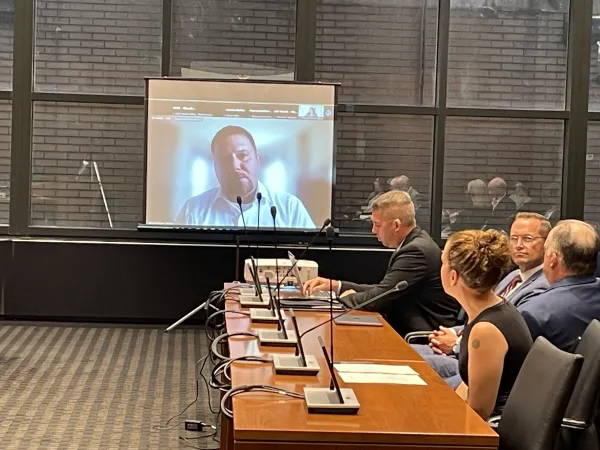Push is on to improve Tier 2 pensions

AFSCME members and Council 31 legislative and policy staff made their voices heard before the state House Personnel and Pensions Committee at a legislative hearing in Chicago on September 6.
They were there to testify on House Bills 4098 and 4099, legislation to make important changes to Tier 2 pension benefits for participants in the State Employees Retirement System (SERS), the State University Retirement System (SURS), and other state-funded pension systems. AFSCME has provided similar testimony during a series of subject-matter hearings conducted this summer on these bills and Tier 2 pension benefits in general.
HB 4098 would accomplish several improvements to Tier 2. Those include adding a deferred retirement option, expanding pension buyouts, lowering the normal retirement age for employees based on years of service, and enhancing annual annuity increases in retirement. The bill also requires that the state fully fund the pension systems by the year 2050.
HB 4099 is targeted specifically towards Tier 2 law enforcement employees in the SERS alternative formula. If passed, it would re-establish equity for correctional employees in IDOC and security employees in the Department of Juvenile Justice and DHS. This includes both restoring alternative formula status for security employees in DHS and reducing the retirement age to 55 with 20 years of service, mirroring other law enforcement titles in the alternative formula. Employee classifications in DOC and DJJ are the only law enforcement jobs in the alternative formula that still have a retirement age set at 60; because security employees in DHS were incorrectly removed from the alternative formula, their normal retirement age is currently 67.
“AFSCME supports making adjustments to the Tier 2 alternative formula to re-establish equity with others in law enforcement regarding retirement age,” Council 31 Director of Research and Employee Benefits Martha Merrill said in supporting the bills. “These changes are not only a matter of fairness, but are also closely connected to safety and staffing.”
AFSCME members Charles Mathis (a correctional officer at Stateville Correctional Center) and Shane Wagner (an educator at Chester Mental Health Center) also testified before the committee.
Mathis said that the Tier 2 retirement age creates very real safety risks for security employees in DOC, DJJ and DHS.
“Having 60-year-old security personnel raises questions about safety within our facilities—not only for staff, but for the population that is housed there,” Mathis told the committee. “It is only appropriate that the General Assembly take action to adjust the retirement age for Tier 2 security employees in DOC and DJJ to age 55.”
Wagner, who has worked as a security therapy aide and, more recently, as an educator for 12 years, described how his work closely mirrors that of law enforcement personnel in corrections.
“DHS security facilities are structured similarly to correctional facilities and work performed by staff closely resembles that of correctional officers,” Wagner said. “Staff follow many of the same rigorous security protocols and precautions used in correctional facilities.”
Despite this, DHS security employees were removed from the alternative formula, which Wagner said has further hurt the DHS’s ability to recruit and retain staff. One side effect is the creation of a revolving-door of new employees who don’t see a future with the department.
“Tier 2 staff are fully cognizant that they are not getting the same retirement benefit as long-term security employees in DHS, or other correctional employees in DOC,” Wagner said. “When I started in 2011, the pension benefit was a strong incentive for employees to remain in their jobs. Now it is increasingly difficult to get trainees to stay.”
“Frankly, it is not possible, nor is it safe, for security employees in DHS to do this work until age 67, which is the normal retirement age under the regular formula,” Wagner said. “Even working until age 60 is of concern given the physical and emotional toll this work can have on staff.”
Some state lawmakers on the committee agreed that Tier 2 is unfair and damages the state’s workforce.
“Everything you have said is spot on—it is unfair,” said state Rep. Steve Reick. “I will be the first to say that. We do need […] to provide a retirement benefit that will attract and retain employees over the long haul.”
AFSCME’s legislative team will monitor all developments with the two bills and stands ready to fight for the legislative fixes needed to correct the inequities of Tier 2.
